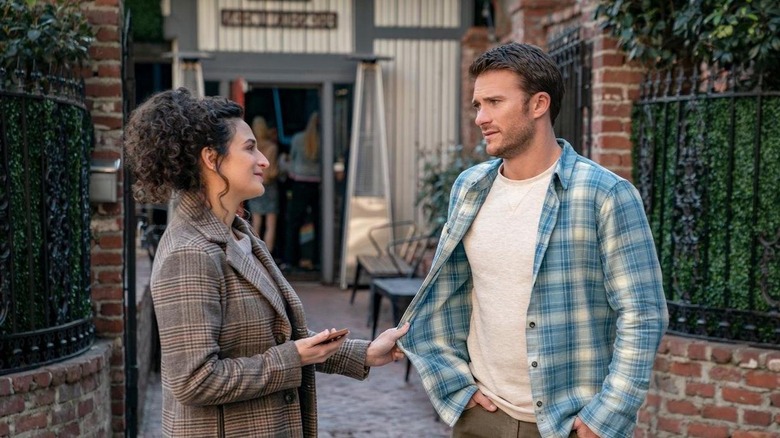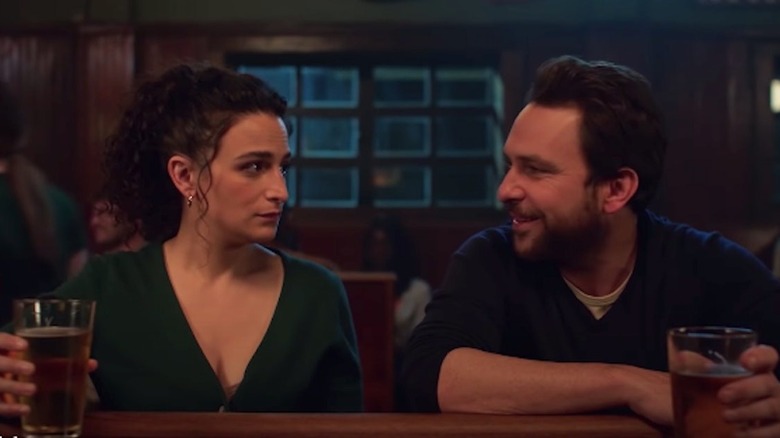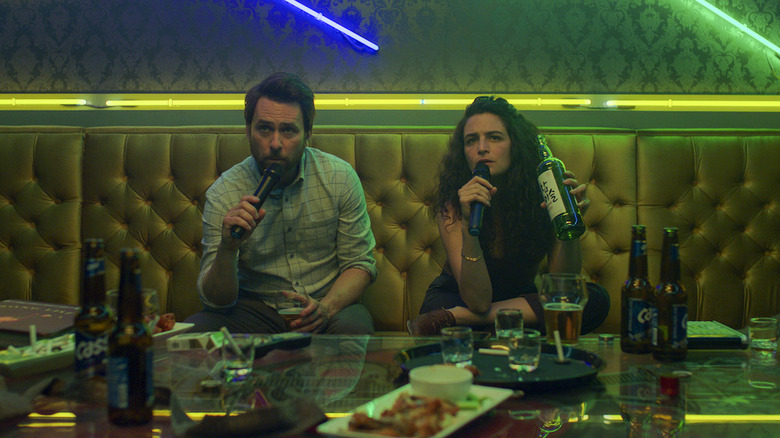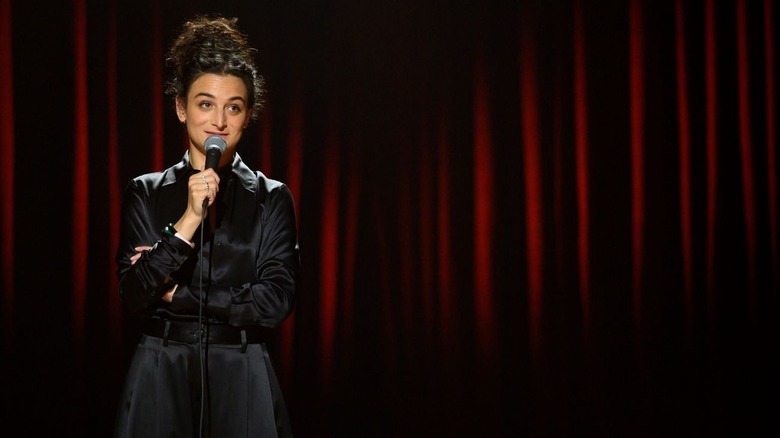I Want You Back Star Jenny Slate On The Relief Of Playing A Charming Character [Interview]
For years, Jenny Slate has been wanting to see more complicated women in romantic comedies. So, for the "Obvious Child" star, "I Want You Back" was a breath of fresh air. In the new movie, Slate plays Emma, a good person who hatches a bad plan to ruin to her ex-boyfriend's new relationship. That's the hook of Jason Orley's romantic comedy, which has just enough honesty to go along with the charm.
Slate stars alongside Charlie Day in the film, and they have a believable friendship that, you guessed it, evolves into a deeper relationship. Together, Day and Slate make it all feel natural, even during the film's broadest moments. Recently, we talked to Slate about the film's many charms, why she doesn't mind line reads, and why doubt is helpful.
"It's so nice to play someone that we all agree should be loved."
Years ago, you said in an interview, "I miss complicated women in romantic comedies." So, was this role refreshing to play?
Yeah, it was. I think a good comp for it is in "While You Were Sleeping," starring Sandra Bullock. I love that movie so much. She tells a terrible lie. Her character tells a terrible lie in that film, but you just want to eat her up. She's just so sweet and funny. You also have to admit that it's incredibly complicated to stand by what she's done, but she for some reason brings you so close that you are willing to go along. Playing Emma in this movie was sort of connecting to that kind of experience.
What was your first impression of Emma on the page?
I think that the first thing I felt was this character is really funny, but if she's only funny, why do we care to watch her go through something like this? I found her to be really lovable and that it seemed to me to be an honor to play someone who we hope will find love. That's where I came from. It's like, oh, it's so nice to play someone that we all agree should be loved. And to see myself even briefly as someone whose specific journey is just that.
And it never feels easy.
Yeah, it isn't. It isn't easy and she's not very good at it. She's good at being lovable, but she's not good at figuring out where the love is actually going to come from. And in one way, I think that's really good because while she's trying to get her ex-boyfriend back, she's becoming closer and closer to this other person. She's so wrapped up in her sort of strange, unhealthy agenda that she doesn't realize that she's making some healthy connection and making a new relationship, a new friendship, and creating new love just by showing her struggle to someone else.
She is charming, too, but the more flawed, the more likable.
Yeah, I would agree. It's a relief to play someone who's charming. Again, it's required that you end up liking this person. But yeah, it felt the same as in real life, like how do you let this person's faults exist and be apparent without making a dent in their lovability? That's a very fun challenge for an actor. And the film itself, it has sweetness at its core. So that sort of sets all the rules as well.
Some actors in romantic comedies, like Matthew McConaughey, have said those roles aren't easy. It's not easy to be charming.
I think it's fun. I mean, whether or not it's hard, I don't know. I think as a person, I want to be pleasing. I mean, in my most healthy way, not in a "I've got to make everyone like me" [way]. I think it is a personal instinct to try to create happiness and connection and be friendly. Those things are important. I actually find this as a mother: I believe in friendship more, I believe in love more, I believe in patience and understanding more when I can model those things. So in a way, it's a relief to try to play someone charming and fun because I know what I would look like if I were my best self.
On a set, when you're in character and the world isn't weighing on you, you're playing a character who, for example, doesn't exist in a pandemic, at least for me in this film and with the right cast and such an incredible co-star in Charlie, I felt very light on my feet. And that was a welcome feeling because I had come out of nine months of pregnancy and 10 weeks of being a new mom and I was ready to just step into something a bit less complicated for a moment.
"We talked a lot about when 'When Harry Met Sally.'"
You called Charlie an incredible scene partner. What makes for an incredible scene partner?
First of all, Charlie is funny in a way that only Charlie can be, and he is a real "born for it" type of person. He's truly born to be funny. He's classic in his humor and he has a ton of energy. It's really, really nice to work with someone who has that amount of energy because he keeps it going all the time. It's brilliant. But he's also really kind and considerate, and I think that's what you need.
It's wonderful if someone's a great actor, but I would imagine it's a huge bummer if they only care about their performance. If they think their performance is the most important thing in the world ... Charlie is really an example of a great co-star because he gives a great performance, but the experience that he allows our community to have is what takes everything to the next level. It was just one of the largest joys of my career to work with him.
A lot of classic romantic comedies have been referenced for this movie. Was there one or two constantly on your mind?
We talked a lot about when "When Harry Met Sally." That's just such a classic. I think that felt like it was a good example to work off of. Also, "Sleepless in Seattle" for me, because it's even discussed in "Sleepless in Seattle" — they're like, "Maybe [Meg Ryan's character is] crazy, this person could be totally nuts. What, she's just writing you letters? She flies there just to look at Tom Hanks and his son, that's crazy." [But it] just isn't when you know the characters well, and you understand where they're coming from. I think you really need that for our movie. Otherwise we're just jerks who are trying to ruin other people's lives, and that's certainly not the case.
Right. That seemed like the big trick of this movie: Not being malicious, but showing characters going down the wrong path.
That's right. Yeah, it's being unsatisfied, feeling really wounded and the tenderness of that. Leading with that and the emergency of it, like, "Oh my God, I actually need to tell this other person that I love them, I think they're making a mistake," and I think that's where we were coming from rather than being like, "Why don't we watch these two weirdos do something even weirder?"
[Laughs] How is Jason on the set? How specific does he get about tone and delivery?
Oh, I think Jason is really specific, while allowing us the room to be what we think the character is. He says what he wants, and that to me, as an actor, is important. I want a lot of direction. I want to know what I'm trying to hit because it often feels like I'll be like, "Okay, so that's what you want," and then I come up with something that's sort of near there, not wrong, but maybe not exactly ... I often sometimes circle a specificity and then I finally get there and I think Jason gave the room of, "We'll figure it out." Generally, you want to make sure that, for example, she's not so sad that we get worried.
Do you have an example of that happening on the set?
The very first scene in the movie, which was the very first scene I shot in this film, my character gets dumped. I just remember saying, "You can even give me a line read, how mad should I be?" Because this is the first time we see her and her reaction to being surprised and rejected is really going to inform the standards for the rest. I'd be like, "What about this line?" He'd be like, "This line is this." And so, it wouldn't be him being like, "Well, what do you think?" It would be more him being like, "I see this line as you're angry, but you're in public and play the surprise more than the anger."
"I'm making a ton of facial expressions I don't even know that I'm making."
Do you often ask for line reads?
I often will. I don't mind a line read at all.
Why is that so polarizing for some actors?
Maybe they think it erases them or it erases their power, but I'm really specific. My face is specific. I'm making a ton of facial expressions I don't even know that I'm making. You can give me a line read, it's not ever going to put me in a box. I honestly think it's just because I'm alive and you can give me a line read, but it will end up sounding like something I did. At least maybe I feel confident in that. Yeah, I don't feel confident in everything. I have a lot of doubt, but I just see it as helpful.
How does the doubt help?
I think oftentimes I want the job because I think I can do it, but my doubt comes in. It's more of a social feeling like, "Oh no, are they reconsidering it?" Like, "Do they wish someone else was here?" And that question, "Do they wish someone else was here?" is something that I've asked in my professional and personal life.
I think a lot of people have their own sort of repetitive questioning that has something more to do with how they see or feel their own identity. So that in one way or another comes with me wherever I go, but it's nice when you have a job or a relationship where that question just suddenly becomes irrelevant.
Say when you're on stage performing and you have so many marks and beats to hit, does the doubt go away?
Yeah, I find that the doubt burns off once I'm on stage, but I feel the risk of every new moment taking a step and hoping that you create the ground underneath you while you are stepping down onto it. I feel that risk. I feel the energy of moments creating themselves as you step into them, but that's part of the type of art that I do, so what can I say?
"I Want You Back" is now available on Prime Video.



